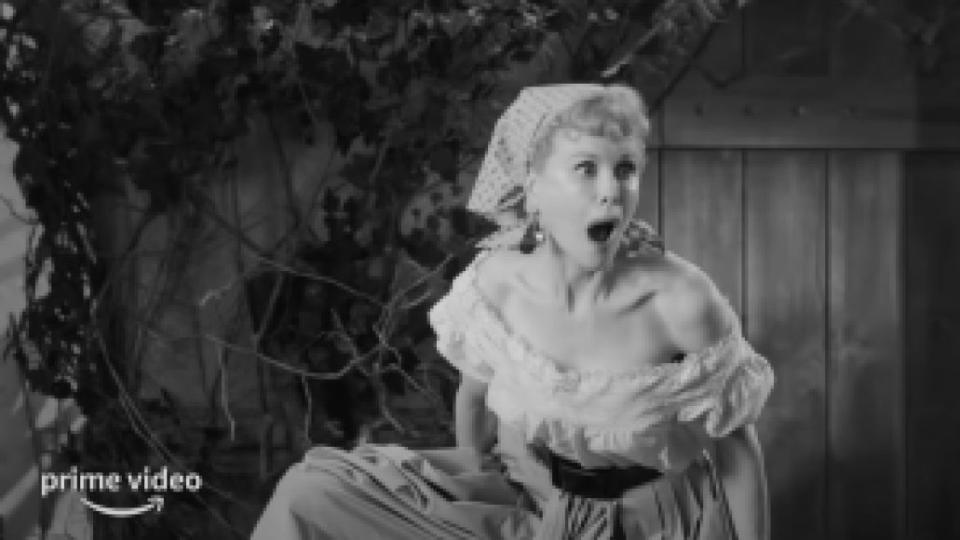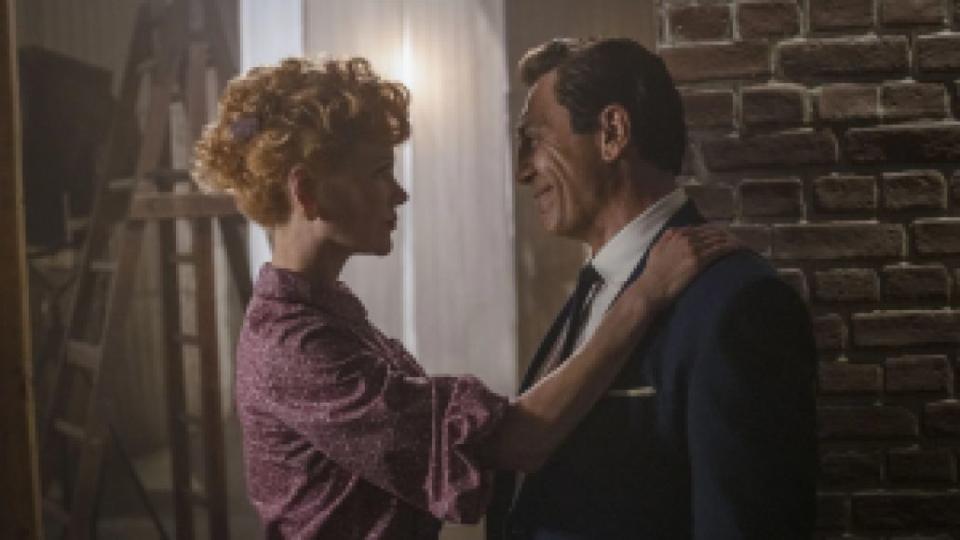Being the Ricardos Review: Aaron Sorkin Again Struggles to Prove He Understands Women — Or Comedy
- Oops!Something went wrong.Please try again later.
- Oops!Something went wrong.Please try again later.
- Oops!Something went wrong.Please try again later.
The post Being the Ricardos Review: Aaron Sorkin Again Struggles to Prove He Understands Women — Or Comedy appeared first on Consequence.
The Pitch: A few weeks prior to the release of Being the Ricardos, writer and director Aaron Sorkin gave an interview to The Hollywood Reporter that caused a bit of a stir — specifically the part where he said, “I remember watching I Love Lucy reruns when I was home sick from school. It’s not a show that if we took a fresh look at today, we’d think was funny.”
Sorkin’s one of the 21st century’s greatest wits, but as Studio 60 on the Sunset Strip survivors will tell you, his grasp on the nature of actual comedy is lacking. And what’s actually amusing about that quote above is how utterly unnecessary it was for him to say it, as his new film about one of the greatest screen couples of all time reveals how fundamentally he fails to understand said couple — especially Lucy herself.
Show Week: The Amazon Studios film is structured around one week in the life of Lucille Ball (Nicole Kidman) and Desi Arnez (Javier Bardem), during which they’re juggling the shooting of a new episode along with a number of huge behind-the-scenes issues, including Lucy’s rumored status as a member of the Communist party (not exactly a cool thing to be in the early 1950s), her looming pregnancy (a groundbreaking moment for American television), and Desi’s rumored infidelity.
It’ll take you less than five minutes on Wikipedia to figure out just how little Being the Ricardos cares about the actual timeline of those events and more, which span a period of about three years but for the sake of this film are crammed into space of five days. That’s easy to forgive, due to long-established practices with biographical dramas like this one. Less easy to forgive is the treatment of its central characters.
Who’s the Boss? One defining aspect of Sorkin’s work in both the worlds of television and film is an obsession with genius, a desperate need to celebrate the hyper-achievers of our world, whether they work in sports, the West Wing, the tech industry, or the courtroom. (Even with Molly’s Game, Sorkin roots the story of a woman who made it big in the world of underground poker in her past as an Olympic-level skier.)
Thus, the expectation here would be that Sorkin would be interested in exploring Lucille Ball’s legacy as a comedian, something which does occur to some degree, as the viewer is treated to glimpses of her working out different takes on the episode in production. But the real hero of the story (not including a late-film audio cameo which shall not be spoiled here, but might honestly be the biggest punchline of the whole damn film) is Desi, who ends up being exactly Sorkin’s flavor of complicated genius, even while seen largely through Lucille’s eyes.
Joshua Malina on Why He Wants to Offer Unnecessary Commentary on His Past Aaron Sorkin Projects
It’s not like the title of this film is Being the Ricardos and By the Ricardos We Mean Only Lucy. No one can claim to be hoodwinked by Sorkin here. But, given his already complicated history when it comes to centering stories around women, you’d have thought someone, at some point, would have pointed out the imbalance in the characters’ treatment, especially when Desi proves himself to be the only really active character in the film, leaving Lucy to flounder and wail.
Oh, Lucy… Perhaps it’s because of this that Bardem’s performance stands out as the strongest of the film. There’s no strong physical resemblance despite the best efforts of the make-up department, but while Bardem never really lets us inside Desi’s secrets, he thrives when digging into all of Desi’s biggest, most crowd-pleasing moments of triumph.
Being the Ricardos (Amazon Prime)
Meanwhile, Kidman’s somewhat controversial casting (emphasized by the first teaser trailer, which deliberately obfuscated her appearance) doesn’t deserve the controversy, but also doesn’t deserve any raves. Her take on Lucy at her most emotional highs and lows has a coolness to it that feels like a combination between Kidman’s natural tendency to play reserved and Sorkin’s natural tendency towards slickness.
For another famous comedian, it might work. But even in the sitcom sequences, the energy simply isn’t there, and the joy that you might hope to experience in watching a brilliant comedian work out the best possible gags for a scene is also absent, smothered by all of the other drama happening behind the scenes.
Some ‘Splaining to Do: Perhaps the script’s strongest quality is the way that Sorkin uses a narrative device of “present day” “interviews” with the I Love Lucy “writers” to cut to flashbacks covering key points of Ball’s career, from losing her contract at RKO after a breakthrough film role to making the leap from radio to television.
In case those quotes above didn’t tip you off, know that the people presented on screen as the older real-life versions of Tony Hale, Alia Shawkat, and Jake Lacy‘s characters are not actually those people — they’re actors playing writers who have been dead for some time, the most recent being Madelyn Pugh in 2011.
As writers are Sorkin’s tribe, it’s hardly a surprise that the I Love Lucy staff is depicted as smart, attractive, and quick with the best one-liners, in both the interview portions as well as the meat of the film. It’s especially true for Shawkat as Pugh, who elevates the sharp-talking dame trope with which she’s saddled by giving Madelyn a sharp, unlikable edge, fueled by her status as a woman way too used to being the only one in the writers’ room.
“Listen, Lady”: While on a production level the design and the cinematography often work together to deliver that feel of old school Hollywood glamour, the film can’t escape Sorkin’s origins as a playwright, and more than one scene gets obsessive with introducing each and every member of the ensemble involved, a painfully unnecessary theatrical touch.
Left to flounder is a subplot revolving around Lucy’s discomfort with co-star Vivian Vance (Nina Arianda) losing weight, a choice Lucy feels is bad for the character of Ethel but, it’s implied, is actually rooted in Lucy’s worry about her upcoming pregnancy. It’s not a big part of the story, but feels like an awkward joke someone made at the dinner table that everyone else at the party just wants to ignore.
Being the Ricardos (Amazon Studios)
Our Bodies, Ourselves: Some of the most interesting moments of Being the Ricardos are those which are in conversation with the way actors are judged on superficial factors like weight and age, but it doesn’t go quite far enough with that concept. There’s one line in particular that’s hard to forget, an aside from William Frawley (J.K. Simmons), who largely exists to make jokes about his alcoholism and impart wisdom. One of those bits of wisdom: “Something dies inside a man, it just dies, the first time he hears a girl call him old.”
It’s not Simmons’ performance that’s the problem; this is the sort of role he handles with ease. What’s haunting about this line is that there’s no sense Sorkin has any understanding that the exact same thing happens to every woman on this planet, but it happens around the time they turn 35 — younger, if they’re an actor.
There’s literally a scene in this movie where Lucy, in her pre-I Love days, has her age thrown in her face by a studio exec, but it’s blithe and forgettable. Because it’s not that Sorkin leaves it to the viewer to put the pieces together. He frankly seems incapable of making that connection himself.
The Verdict: It’s just one symptom of the disease afflicting Being the Ricardos, which tries too hard to pack too much in, and ends up incapable of saying much at all as a result, which is baffling, because it’s such a talky movie. There’s a great film to be made about these two iconic television talents and their respective egos. Unfortunately, Sorkin’s own ego casts too large a shadow here for us to be able to see it.
Being the Ricardos drops in theaters on December 10th, 2021, and will be available on Prime Video on December 21st.
The Trailer:
Being the Ricardos Review: Aaron Sorkin Again Struggles to Prove He Understands Women — Or Comedy
Liz Shannon Miller
Popular Posts
Sylvester Stallone Sparks QAnon Speculation with Coded Selfie
Machine Gun Kelly Tried Catching a Knife to Impress Megan Fox, Stabbed Himself
Fight Breaks Out During Three 6 Mafia and Bone Thugs-N-Harmony's Verzuz Battle
Dave Grohl Covers Van Halen's "Jump" with Greg Kurstin on Night Four of Hanukkah: Watch




